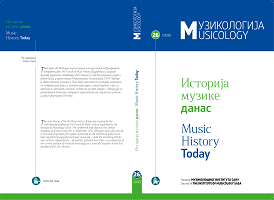Post-factual Music Historiography: Legends of Art–Religion
Post-factual Music Historiography: Legends of Art–Religion
Author(s): Helmut LoosSubject(s): Cultural history, Music, Social history, 18th Century, Sociology of Art, History of Art
Published by: Muzikološki institut SANU
Keywords: music history; “Two-World Model”; historiography; post-truth; Beethoven;
Summary/Abstract: In many of its areas, the writing of music history in Germany is characterised by the Romantic music outlook and its “Two-World-Model”: the real world is seen as opposing the ideal world of music as a higher existence of ideas and ideals. Art music in the emphatic sense, commonly designated as serious music, pretends to represent that ideal world and makes claims to truthfulness. The science of music actually believes it is able to prove the universality of these claims. A large part of musicological publications are characterised by this assumption. However, a public discussion among musicologists as to whether such writings should belong to the field of theology rather than to historico-critical historiography (as a science in the strict sense) is non-existent. As a result, our field has not only disappeared from a public sphere that wishes to leave those claims to small elitist circles, but has also encountered a growing lack of understanding among other disciplines, even to the point of mockery. It would suffice here to refer to the lawyer Bernhard Weck, who wrote with regard to Beethoven’s Opus 112: “Only musicology could prove that ‘political ideas of freedom can be expressed through gestures of sound.’”
Journal: Muzikologija
- Issue Year: 1/2019
- Issue No: 26
- Page Range: 91-105
- Page Count: 15
- Language: English

